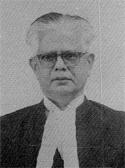
Meet Justice J.C. Shah and his Notable Judicial decisions
Justice Jayantilal Chhotalal Shah (1906–1991) was the 12th Chief Justice of India, serving from December 17, 1970, to January 21, 1971. Born in Ahmedabad, he was educated at R.C. High School, Gujarat College, and Elphinstone College, Bombay, before studying law and beginning his practice in Ahmedabad in 1929. Justice Shah’s early legal career included a notable role as part of the prosecution team in the Mahatma Gandhi assassination case in 1948. He was appointed as a judge of the Bombay High Court in 1949, serving for a decade before his elevation to the Supreme Court in 1959.
Judicial Career and Philosophy
Justice Shah was known for his discipline, erudition, and commitment to the rule of law. During his Supreme Court tenure, he authored an extraordinary 728 judgments and sat on 2,094 benches, with a particular focus on direct taxation, property, and constitutional law. His judgments were marked by clarity, analytical depth, and a strong belief in the protection of citizens’ rights and the constitutional framework.
Landmark Judgments
1. R.C. Cooper v. Union of India (Bank Nationalisation Case, 1970)
Justice Shah’s most celebrated judgment came in the R.C. Cooper v. Union of India case. Following the nationalisation of 14 private banks by Prime Minister Indira Gandhi in 1969, Dr. R.C. Cooper challenged the move, arguing it violated the fundamental rights of shareholders. Justice Shah, writing for the majority, struck down the nationalisation ordinance, holding that the law must not violate the right to property and must ensure fair compensation. The judgment was pivotal in expanding the scope of Article 19(1)(f) (right to property) and Article 31 (compulsory acquisition of property), and it established that the effect of a law on fundamental rights, not just its form, must be examined. This case set a precedent for judicial scrutiny of state actions affecting civil liberties and property rights.
2. Role in the Gandhi Assassination Trial
Before his judicial appointments, Justice Shah’s participation in the prosecution of Nathuram Godse and others in the Mahatma Gandhi assassination case demonstrated his commitment to justice and the rule of law during a critical period in Indian history.
3. Shah Commission of Inquiry
After retiring from the Supreme Court, Justice Shah was appointed by the Janata Party government to head the Shah Commission of Inquiry (1977–1978), which investigated the excesses and human rights violations during the Emergency (1975–1977). His detailed reports, tabled in Parliament, documented the suspension of civil liberties and abuses of executive power, playing a critical role in India’s democratic accountability and legal reform.
Legacy
Justice J.C. Shah is remembered as a patrician and strict disciplinarian, whose judgments and post-retirement work reinforced the judiciary’s role as a guardian of fundamental rights and constitutional values. His legacy endures in the principles of judicial independence, protection of civil liberties, and the robust scrutiny of executive action that he championed throughout his career.











comments